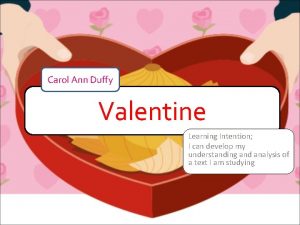Dream of a Lost Friend Carol Ann Duffy












- Slides: 12

Dream of a Lost Friend Carol Ann Duffy

Objectives To explore Carol Ann Duffy’s thoughts and feelings about losing a friend to a deadly illness

Starter What do you know about the AIDS virus? http: //www. youtube. com/watch? v=TMnb 536 Wu C 0

AIDS The disease has killed 30 million people in the world since it was discovered in 1981. There around 35 million people today that have HIV There was a great deal of discrimination about AIDS and the type of people that contracted the illness. There is no known cure


Dream of a Lost Friend Read the poem through twice. The poem is about the speaker who dreams about a friend that recently died of AIDS. The speaker feels guilty for a number of reasons, including not going to the funeral.

Title The title is a euphemism. Why does she use ‘lost friend’ instead the truth? What does this tell us about the speaker?

Stanza 1 1. 2. 3. 4. The first two lines mixes tenses, ‘dead, dreaming’, why does she juxtapose two tenses like this? In the first three lines we are presented with two caesuras. What is their effect on the pace and tone of the poem? Why has her friend been reduced to a single description, ’Your white lips’? Who is speaking in italics? Is it the friend or the poet?

Stanza 2 1. 2. 3. 4. Identify the personification in the first and second line and comment on the impact. ‘Frenzied prayers to Chemistry’ is an interesting use of juxtaposition. Why? ‘A child-man’s laugh’ is an example of an oxymoron. What does it suggest about her friend in their dying days? What is the meaning of ‘out of your skull’?

Stanza 3 1. 2. How is the virus personified in the first three lines? What does this suggest about the virus? How do healthy people talk about the virus? What do they think about it?

Stanza 4 1. 2. 3. ‘I missed your funeral’, this implies the speaker’s guilt. Why didn’t she go? ‘Where there’s life…’ what should be at the end of this phrase? Why is it missing? What is the impact of the final two lines of the poem?

Structure The poem has a regular line length and rhythm. This could symbolise time moving on or the inevitability of the disease progressing.
 Carol ann duffy war photographer friend
Carol ann duffy war photographer friend Anne hathaway (poem)
Anne hathaway (poem) Hello my friend hello my future
Hello my friend hello my future Hello my friend song
Hello my friend song Luke 15:11-35
Luke 15:11-35 The devils wife carol ann duffy
The devils wife carol ann duffy Valentine carol ann duffy essay
Valentine carol ann duffy essay Stealing by carol ann duffy
Stealing by carol ann duffy Standing female nude analysis
Standing female nude analysis Head of english analysis
Head of english analysis Carol ann duffy we remember your childhood well
Carol ann duffy we remember your childhood well Originally carol ann duffy annotated
Originally carol ann duffy annotated Selling manhattan carol ann duffy analysis
Selling manhattan carol ann duffy analysis























